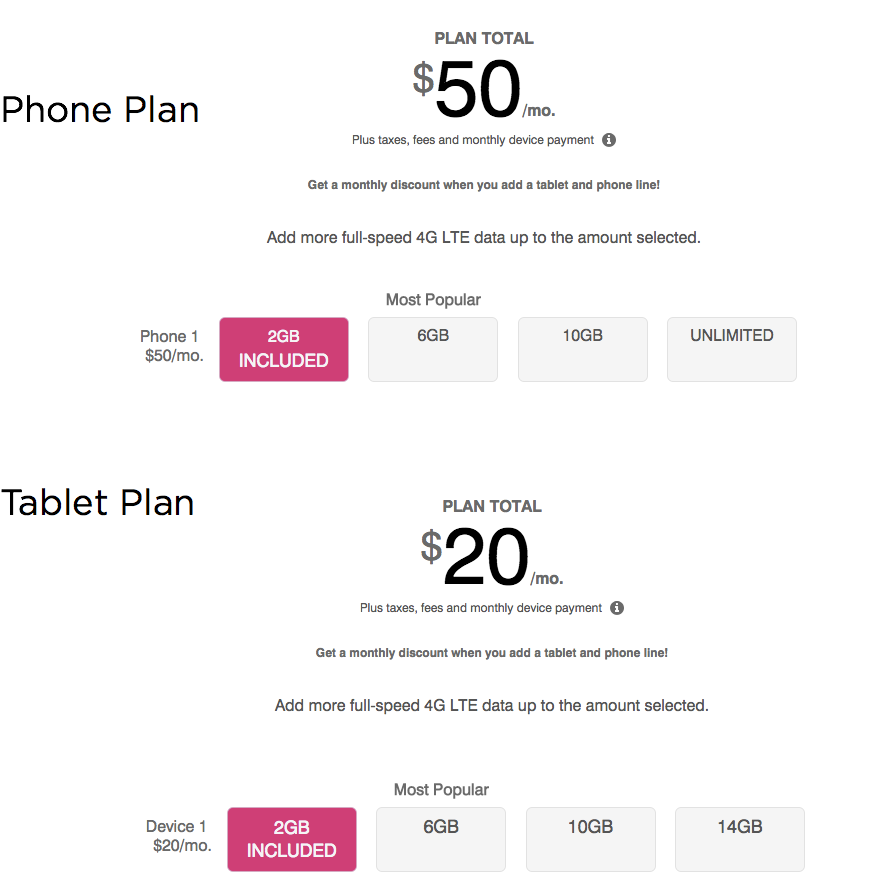Questions to Carriers: Why Do Mobile Carriers Bundle Their Services?

Have you ever wondered why mobile carriers bundle all their services together? In a recent Charge blog post, we discovered that the vast majority of activities we do on our mobile devices use data only. But mobile carriers don’t offer data-only plans for phones. In fact, it’s actually pretty hard to find a data plan for a phone that doesn’t automatically include unlimited talk and text. Why is that the case? How come mobile carriers force consumers into bundled plans rather than allowing consumers to choose the service(s) they want? And why can’t we at least choose the amount of each service we want?
First and foremost, mobile carriers care about their bottom line. And a forced bundled plan will make more money for a mobile carrier than giving customers the ability to choose individual services. Second, mobile carriers have a strong hold on customers. There are only four major mobile carriers in the US, all of which have a comparable quality of service. Lack of competition makes it unlikely that customers will find a good reason to switch, and carriers use that to their advantage.
Aside from these two factors, there truly isn’t much stopping carriers from unbundling mobile plans.
In fact, at one point in time mobile carriers only offered voice calling. Do you recall peak and non-peak calling hours? How about free weekend minutes or the Fave 5? Later, SMS became an alternative to voice and carriers began to offer plans with both minute and SMS allotments. Even later, with help from the advent of smartphones, data become a third service offered by mobile network operators. So since each service entered the mobile market at a different time, it is clear carriers could certainly deliver unbundled service.
Actually, prior to serious data consumption via mobile devices, mobile service contracts were relatively easy to parse. Individual and family share plans were simple: you chose specified minute allotments and specified SMS allotments, according to you or your family’s estimated usage. If you only wanted voice that was fine, or you could have both. If you went over your minute or SMS allotment, you were charged for overages on a per minute or per SMS basis.
It wasn't until Apple and AT&T partnered to introduce the iPhone that mobile plans saw a distinctive change. With the iPhone, two services were necessary to unlock its full functionality: data and voice minutes.
“We want to make choosing a service plan simple and easy, so every plan includes unlimited data with direct Internet access, along with Visual Voicemail and a host of other goodies,” said Steve Jobs, Apple’s CEO
So the original iPhone service contracts bundled data with voice minutes. But SMS was still unbundled. If you take a look at the original iPhone plans, they were focused on different sized minute plans because voice was the spectrum-hungry service at the time.

Fast forward to today and now there are more smartphones in the US than feature phones. Meaning data usage is now the cause of network congestion rather than voice. So carriers have restructured plans once again, this time with unlimited talk and text and limited data allotments. But wait a minute, why did talk and text suddenly become unlimited? Why can’t we still choose how many minutes and texts we want with our data allotment?
Well, technically in some cases you can. But only with a select few prepaid plans which typically offer either older generation smartphones or feature phones and come with other strings attached. All four major carriers’ postpaid plans (and most of their prepaid plans) include unlimited talk and text. There is no choice for customers. But as we already figured out those services aren’t tied to data. So why are we forced to buy bundled plans?
When you ask this to a mobile carrier representative the answer you typically get is something along the lines of “unlimited talk and text is included”.

But nothing is truly free. Just like phone subsidies weren't really free. Voice and SMS still cost carriers money to provide. So when those services are bundled in or "included", we are consequently paying up-charges for data on our phones. For instance, take a look at T-Mobile’s current mobile plans. The cheapest individual plan for a phone is $50 for 2GB of data. Meaning you are paying $25 per GB, if talk and text are actually “included for free”. Or they are charging for the forced bundled unlimited talk and text. Their tablet data plan on the other hand, costs $20 for 2GB.

The fact is, none of these mobile carrier services are truly tied together nor do they have to be. We know that from history. Mobile carriers just choose to do so because it helps them make more money. As consumers we pretty much have to accept it, which is only one of the reasons most people hate their mobile carrier. But it’s obvious the potential for unbundled plans is there. The question is, will a mobile provider step away from the industry standard of bundled plans to give consumers what they want? There’s no good reason why it can’t happen.